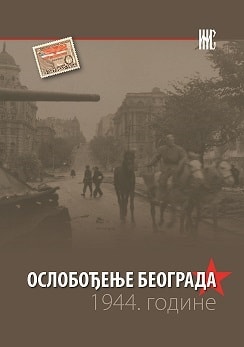Москва и антифашистское движение И. Броз Тито (январь – начало октября 1944 г.)
Moscow and the Anti-Fascist Movement J. Broz Tito (January - early October 1944)
Author(s): Andrej Borisovič Edemski
Subject(s): Diplomatic history, Military history, Political history, International relations/trade, WW II and following years (1940 - 1949)
Published by: Institut za noviju istoriju Srbije
Keywords: Yugoslavia; USSR; Great Britain; Liberation of Belgrade; The Second World War; anti-fascist movement;
Summary/Abstract: The author uses documents of Vjacheslav Molotov’s collections from Russian State Archive of Social-Political History (Rossiyskii gosudarstvenniy arhiv sotsialno-politicheskoy istorii / RGASPI. Fond 82) and Archive of Russian Foreign Policy (Arhiv vneshnei politiki Possiiskoy Federatsii /AVPRF: Fond 06), and several others more consistently than before. On the base of synthesis of these documents with already published Soviet and Yugoslav archival documents and the results of still valuable early research conducted by Nikola Popovic, Yuriy Girenko, Leonid Gibianskiy and Vladimir Volkov this article sheds more light on interrelations and coordination between Soviet leadership and J. Broz Tito from January 1944 to beginning of Belgrade operation October 1944. Several stages of these interrelations are discovered and reviewed this time in some cases more detailed than in previous research. The article discusses main events from January 1944 when decision on formation of Soviet military misson to Yugoslavia was made to end of February when it had beem landed to location of Tito’s headquarters assuming that key trends in this period were coordination of Tito’s activity in international field during end of January–early February. Despite the fact that each stage was important during 1944 it seems that April was extraordinary one because of coming of Yugoslav military mission to the USSR, inner Soviet discussions on the ways and means to improve the assistance to Yugoslav people army, and, the third one, Soviet decision to inform Tito by Stalin (that time codename „Friend”) and Molotov (codename „Alekseev”) that not Bulgaria but Yugoslavia is main Soviet ally on the Balkans during this war and after it. According to documents the end of May and early June when two meetings of Stalin with Yugoslav mission was the point when the final shift in understanding of British activity was made. The stage of July–August when the main stress of Yugoslav liberation forces has been shifted on Serbia the Soviets gave Tito free hand in his contacts with Britain and at the same time gave him full support in Yugoslavia by concentrating all assistance in his hands since only after Tito’s approval this assistance might be get by regional detacheemnts. Despite the fact that author could not obtain Soviet documents on secret Tito’ visit to Moscow in September 1944 he continues the reconstruction of context of these events by involving available indirect data around Tito’s meetings with Soviet leaders that time. The article ends with analysis of already published Soviet military documents on preparations of the Red Army early October 1944 before entering Yugoslavia as friendly country on which despite of they were already have been published were not paid attention by researchers until nowdays.
Book: Ослобођење Београда 1944.
- Page Range: 95-129
- Page Count: 35
- Publication Year: 2010
- Language: Russian
- Content File-PDF

